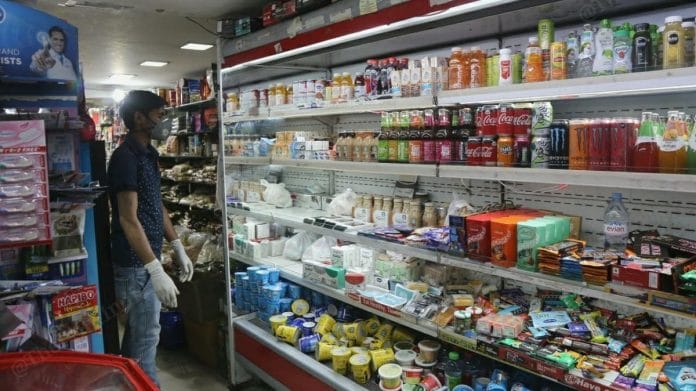New Delhi: Private consumption in India is likely to be adversely affected by the Covid-19 pandemic and the country will have to brace for deflationary pressures in the face of weakening demand globally, according to the monetary policy report released by the Reserve Bank of India (RBI) Thursday.
The Indian rupee will also be under pressure due to capital outflows, the RBI warned, while sticking to its earlier stance of not providing any growth projections for 2020-21 in the face of extreme uncertainty amid the coronavirus crisis.
The Indian rupee has fallen to a record low of 76.3 in the last couple of weeks with many analysts forecasting that rupee is likely to fall further to 77.
The RBI’s report comes at a time when India has entered the third week of the lockdown, which is scheduled to end on 14 April.
However, many states have demanded an extension of the lockdown to control the pandemic. An extension of the lockdown is expected to further hit economic activity that has already come to a halt.
“Covid-19, the accompanying lockdowns and the expected contraction in global output in 2020 weigh heavily on the growth outlook. The actual outturn would depend upon the speed with which the outbreak is contained and economic activity returns to normalcy,” the report said.
“Significant monetary and liquidity measures taken by the Reserve Bank and fiscal measures by the government would mitigate the adverse impact on domestic demand and help spur economic activity once normalcy is restored,” RBI said, adding “COVID-19 hangs over the future, like a spectre”.
Also read: How India can buck the trend of global recession caused by coronavirus
‘Domestic production to be hit’
The RBI said the economy hit a multi-quarter low in Q3 of 2019-20 and going forward, the risks are tilted largely to the downside.
“Private consumption, in particular, is at serious risk from the Covid-19 pandemic, notwithstanding improved rabi prospects and the recent rise in food prices, and the rationalisation of personal income tax rates in the Union Budget 2020-21 along with measures to boost rural and infrastructure spending,” according to the report.
“Aggregate demand is expected to be impacted adversely by a likely recession in the global economy, caused by disruptions in global supply chains, travel and tourism, and lockdowns in many economies. Domestic production will also be impacted by the nation-wide lockdown. In the near-term, the challenge is to mitigate the adverse impact of Covid-19,” it added.
The Indian economy was forecast to grow at 5 per cent in 2019-20. However, the growth is likely to be lower, with the pandemic impacting economic activity in March.
The RBI said domestic financial markets remain vulnerable to global developments, deepening the growth slowdown in India.
The external sector outlook is characterised by “heightened uncertainty with capital outflows continuing and exerting pressures on the INR”.
Inflation outlook has become uncertain
The central bank also warned that since March 2020, inflation outlook has become highly uncertain due to the Covid-19 outbreak turning into a pandemic.
“Crude oil prices have collapsed to lows not seen since the early 2000s. With several major economies in lockdown mode, demand conditions may weaken sharply. Accordingly, countries across the world are bracing up for deflationary forces to take hold. India may not be immune to these extreme downside pressures imparted by the pandemic,” the RBI added.
Also read: Modi govt is seeking $6 billion of loans to fight coronavirus






